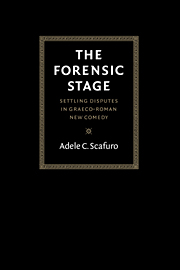Book contents
- Frontmatter
- Contents
- Preface
- Author's note on terminology, transliteration, translation, and texts
- List of abbreviations
- Introduction
- PART I PRE-TRIAL PLAYS
- PART II RECONCILIATION AND ITS RHETORIC
- 3 Arbitration and reconciliation in Athens and Rome
- 4 Scenarios of arbitration and reconciliation in New Comedy
- 5 Redress for sexual offenses in Athenian and Roman law
- 6 The resolution of seduction and rape in New Comedy
- 7 Arguing behind closed doors
- PART III PLAYING ON THE BOUNDARIES OF THE LAW
- APPENDICES
- Works cited
- General index
- Index locorum
4 - Scenarios of arbitration and reconciliation in New Comedy
Published online by Cambridge University Press: 03 March 2010
- Frontmatter
- Contents
- Preface
- Author's note on terminology, transliteration, translation, and texts
- List of abbreviations
- Introduction
- PART I PRE-TRIAL PLAYS
- PART II RECONCILIATION AND ITS RHETORIC
- 3 Arbitration and reconciliation in Athens and Rome
- 4 Scenarios of arbitration and reconciliation in New Comedy
- 5 Redress for sexual offenses in Athenian and Roman law
- 6 The resolution of seduction and rape in New Comedy
- 7 Arguing behind closed doors
- PART III PLAYING ON THE BOUNDARIES OF THE LAW
- APPENDICES
- Works cited
- General index
- Index locorum
Summary
THE ARBITRATIONS OF EPITREPONTES AND RUDENS
A comparison of procedure
The most celebrated scenes of arbitration in New Comedy appear in Act ii of Menander's Epitrepontes and in Act iv 3 and 4 of Plautus5 Rudens, which is based on an unidentifiable play by Diphilos. What is immediately striking about these scenes is their elaborate parody of dispute settlement: in both, the disputants are slaves, and here they display well-honed forensic skills which would rarely be theirs to exhibit in a court of law – with remarkable eloquence on the part of one disputant in Epitrepontes and with savvy urbanity on the part of another in Rudens.
In Epitrepontes, Suros, a charcoal burner and slave of Kharisios, quarrels with the shepherd Daos over the ownership of trinkets which the latter had found together with a new-born infant; Daos had handed the infant over to Suros, but had kept the trinkets for himself. The dispute is decided by Smikrines who unwittingly arbitrates the fate of his own grandson. In Rudens iv 4, Trachalio, slave of Plesidippus, and Gripus, fisherman and slave of Daemones, dispute the ownership of a trunk which the latter has fished out of the sea. Trachalio suspects that the trunk belongs to the pimp Labrax and that it contains the birth tokens of his master's sweetheart Palaestra. Daemones is called upon to arbitrate the dispute and so ends up, unwittingly, the arbiter of his long-lost daughter's identity.
- Type
- Chapter
- Information
- The Forensic StageSettling Disputes in Graeco-Roman New Comedy, pp. 154 - 192Publisher: Cambridge University PressPrint publication year: 1997



